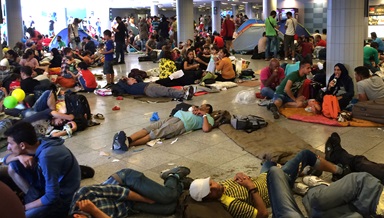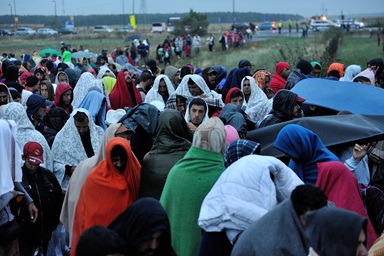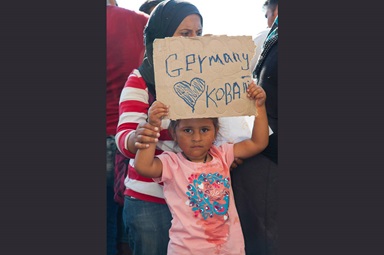As refugees continue to trek across Europe, Methodist leaders are recognizing that church members there may “experience and interpret” the effects of that migration in different ways.
But European church leaders said that those who play on people’s fears must be challenged and encouraged support to those in need.
God calls the church “to welcome those who arrive as our fellow pilgrims,” the European Methodist Council said in a pastoral letter to the Methodist, Wesleyan and united churches in Europe, as well as the European public.
“We commit ourselves to immediate actions and the long-term perspectives that the issues raised by migration require,” the letter declared. “With a united voice, the European Methodist Council calls on our fellow citizens across the continent to join us in reflection and action.”
Thomas Kemper, top executive of the United Methodist Board of Global Ministries and a German citizen, has issued a statement noting the difficult yet necessary work of welcoming “the thousands of displaced persons pouring out of Syria, Iraq, Afghanistan, and various parts of Africa into Europe.”
Other European churches and ecumenical organizations also are offering vocal support and taking action.
HOW TO HELP
The United Methodist Committee on Relief has worked with local partners in Italy and Greece to provide emergency relief to refugees arriving in those gateway countries to Europe. Donate to UMCOR’s international disaster response
Recognize and reaffirm
The European Methodist Council’s letter was released after the group concluded a meeting in Ruse, Bulgaria, on Sept. 15. The consultative body brings together United Methodist and Methodist leaders to share information, discuss common issues and support the work of the Fund for Mission in Europe.
Council co-chairs are the Rev. Donald Ker of Ireland and United Methodist Bishop Christian Alsted, leader of the denomination’s Nordic and Baltic Area.
As a matter of general principles, the letter asks the European churches to:
- Renew our understanding and practice of the obligation to radical Christian hospitality to all, recognizing the practical implications for congregations and individuals.
- Acknowledge that migration has and always will be a part of the human story.
- Recognize that we experience and interpret the reality of migration to and within Europe in different ways, depending on our context.
- Resist false narratives, generalizations and negative stereotyping and challenge those who would play on people’s fears.
- Reaffirm our Christian commitment to honor Christ in the face of the stranger regardless of religious background or the prevailing political situation.
- Encourage and support those who dare to open their doors and offer hospitality to those in need.
- Pledge both our continuing solidarity with those parts of world from which migrants and refugees come and our active engagement to achieve a just and peaceful world.
‘Radical hospitality’
“Methodists across Europe are doing what they can to extend radical hospitality both in countries of entry, countries of transit and in countries where refugees will be living for a foreseeable time,” Alsted told United Methodist News Service.
Council members said they found strength and inspiration in the fellowship with the Methodist family. “We have drawn hope and inspiration from stories of Methodists working in many places to assist migrants and refugees,” the letter noted.
“Often these are small groups of our sisters and brothers tirelessly fulfilling our common commitment to Christian hospitality and care. We give thanks to God for their vision, courage and continuing service in the name of Christ. May we all draw inspiration from their example.”
Alsted pointed to the “astounding ministry” of Italian Methodists, both on the island of Lampedusa, where many refugees arrive after treacherous trips across the Mediterranean, and in several other parts of Italy.
During the council meeting, the Methodist Church in Italy presented facts and best practices on dealing with the refugee crisis, demonstrating how a small church can respond. Professor Yann Redalié from the Methodist-Waldensian theological faculty in Rome offered a reflection on the biblical-theological background to the issue of migration.
Theology and migration
A time for theological reflection on migration was followed by small-group discussions to identify needs and the drafting of the pastoral letter.
The council meeting provided opportunities to hear about specific experiences related to migration issues in each country, said the Rev. Üllas Tankler, an executive with the United Methodist Board of Global Ministries. One concern, he noted was how to address fears that the crisis has raised in various communities, particularly in Eastern Europe.
“In most places, the Methodist church is small in the community,” Tankler explained. “Sometimes, there is a good cooperation with humanitarian-diaconal organizations. In other cases, Methodists send their own representative to the refugee camps on country borders to learn what the real facts are.”
The council’s letter acknowledges the complexity of the current migration crisis and that church members hold a variety of political and theological views.
“We seek to move beyond a sterile discussion about the rightness of migration to engaging with the many complicated issues involved in the crisis affecting our continent,” the letter stated. “In all this, we are aware of our own limitations and the need of the help of others.”
Everyday reality
The Rev. Michael Nausner, a United Methodist who is a professor and dean of international affairs at the Reutlingen School of Theology in Germany, told United Methodist News Service that responding to the refugee crisis requires large-scale participation.
“Immigration is no longer an issue that can be thoroughly planned and bureaucratically managed by officials; it is an everyday reality that could not be handled without countless people who welcome, donate and assist,” he wrote in a Sept. 11 email.
Earlier that week, Nausner had stayed with Methodist friends in Hamburg helping out at a refugee camp with tents next door. Camp organizers, he was told, were forced to turn back both volunteers and donations because they were overloaded. Similar gestures of welcome have occurred elsewhere in Germany, Austria and at his own theology school.
“In Vienna, Austria, for example, Methodists are among those holding up ‘Refugees Welcome’ signs at the railway station, and the biggest United Methodist church in Vienna is - as I type these lines - calling for mattresses and volunteers to help host up to 50 refugees if need be in the church facility,” he wrote.
Bloom is a United Methodist News Service multimedia reporter based in New York. Üllas Tankler, staff with the United Methodist Board of Global Ministries, contributed to this report. Follow Bloom at https://twitter.com/umcscribe or contact her at (646) 369-3759 or newsdesk@umcom.org
Like what you're reading? Support the ministry of UM News! Your support ensures the latest denominational news, dynamic stories and informative articles will continue to connect our global community. Make a tax-deductible donation at ResourceUMC.org/GiveUMCom.





